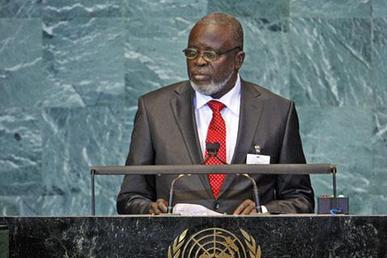
Recently strengthened relations between Guinea Bissau's Prime Minister and the military should help the country transition to new leadership after the death of President Malam Bacai Sanha was announced Monday, said International Crisis Group Senior Analyst, Vincent Foucher.
"People are worried, but structurally speaking, if it's possible to speak structure in a place like Bissau, my global assessment is that we have seen a strengthening of the Prime Minister and the Chief of Staff working with him," he said. "Of course this strengthening doesn't mean that no trouble will happen."
Sanha's death in a Paris hospital was announced Monday by the president's office, though they did not cite a cause of death. Sanha had been repeatedly hospitalized since he was elected in 2009.
Foucher added that the President of the Assembly, Raimundo Pereira will now take power until new elections, which according to the constitution should take place within 60 days.
"Raimundo Pereira, does not have a special history with the military himself. He's very much seen as an associate of the Prime Minister. So his history with the military we can assume will be pretty much the Prime Minister. And it's a complex history," he said. "There were tensions on April 2010 last year. Prime minister Gomez was actually arrested for a few hours and apparently mishandled by some military."
On December 26, a group of soldiers attacked army headquarters in Bissau, which the regime said was an attempted coup. But Foucher said relations between Prime Minister Carlos Gomez and the military have improved since then, and he added that the situation can even be considered a victory between Gomez and the military.
"It has not really been the history of the Guinean army to take power," said Foucher. "Usually what they do is remove a civilian and organize a transition. And then there's another civilian coming up. It's an army that has for some reason a sense that it shouldn't be itself in power, but that nevertheless the civilian part of the state must respect its rights and its privilege's."
The situation in Bissau had been improving over the past two years, said Foucher, largely in part due to international organizations increasing money donations in the area in efforts to tackle drug trafficking.
Losing candidate in Guinea-Bissau election accepts results
Youth organizations in Guinea set to launch hunger strike
Locust swarms in North Africa ease
Better development through education
(來源:VOA 編輯:Rosy)
